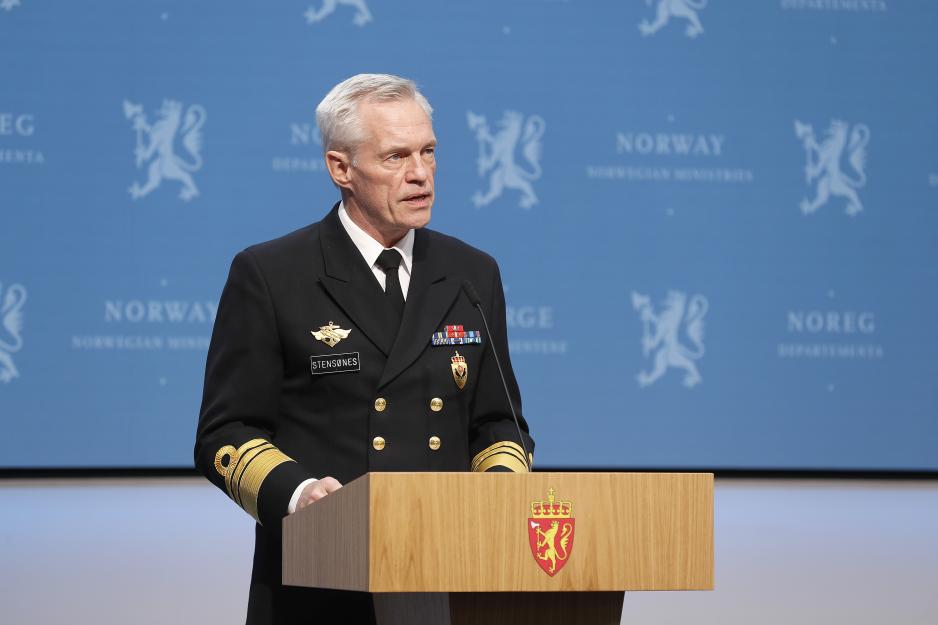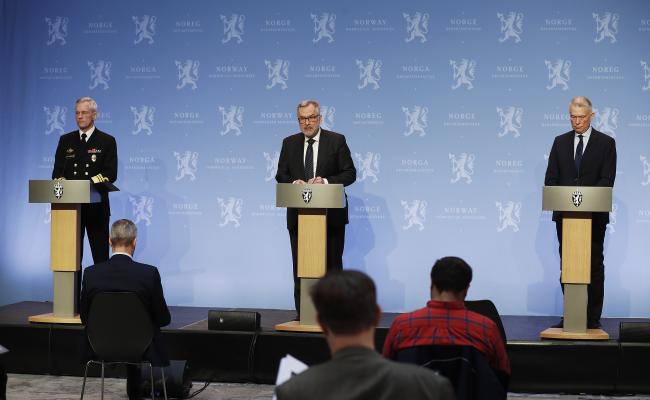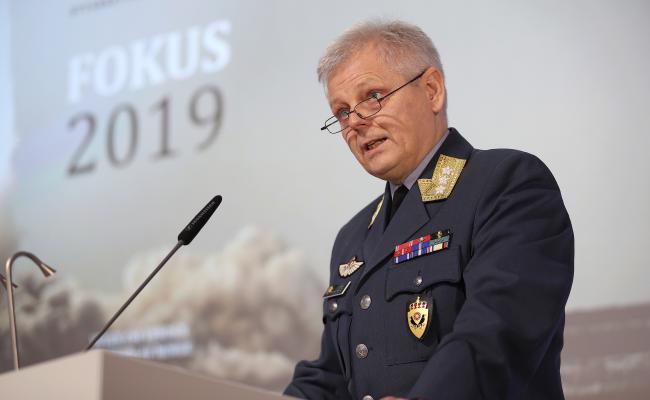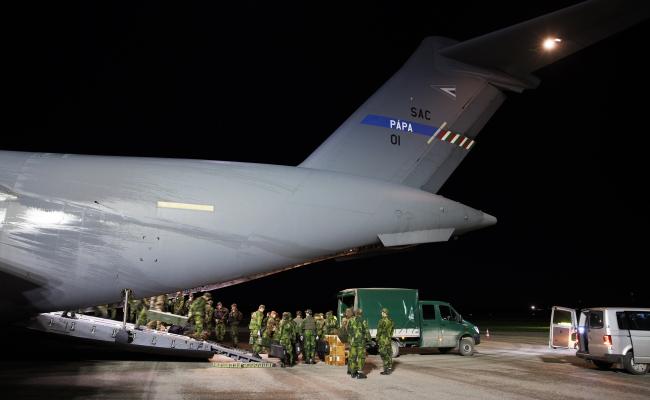Norwegian Intelligence Service: The Arctic is Increasingly Important

Chief of the Norwegian Intelligence Services Vice Admiral Nils Andreas Stensønes during the presentation of the ‘Focus 2022’ threat assessment in Oslo on 11 February. (Photo: Torbjørn Kjosvold, Norwegian Armed Forces)
The Arctic is increasingly important to the great powers. Despite security policy tension between Russia and the West, Russian behavior in the High North nevertheless shows that Moscow has an interest in a stable Arctic, according to the Norwegian intelligence services’ most recent threat assessment.
The Norwegian Intelligence Service (NIS), the Police Security Service, and the National Security Authority last Friday presented their open threat and risk assessment for 2022.
The three actors all emphasized that Norway is facing a complex threat image. This includes the fact that tools used against Norway are below the threshold for direct conflict. Examples of such tools include attempts at political influence, information and network operations, as well as theft of modern advanced technology.
China and Russia are once again mentioned as the two most prominent threats.
The Russian military power is the biggest military threat against Norwegian sovereignty, population, territory, key societal functions, as well as infrastructure, Chief of the Intelligence Services Vice Admiral Nils Andreas Stensønes said at the press conference.
“Several of Russia’s most advanced weapon systems (…) are part of the military development of the Russian forces in recent years. They have the ability to hit goals very precisely across vast distances”, Stensønes commented.
The Arctic is of strategic importance to the great powers.
The importance of the Arctic is increasing
Great power rivalry is also the subject of attention in the threat assessment report from NIS. The report, Focus 2022, a.o. points out how increasing competition between great powers leads to a more polarized situation in which smaller states, like Norway, more frequently have to take a stand on international conflict issues.
Following on from this, the Intelligence Services stress that the Arctic is becoming increasingly strategically important to the big powers.
“Thawing sea ice leads to increased access to resources and new trade routes. Moscow perceives western military activity in teh region as a threat to Russian interests and argues that other states promote climate measures to prevent Russian activity.”
Furthermore, Norway is accused of acting as a facilitator of increased “militarization” in the North, according to the Intelligence Services, which expound on this Russian perspective:
“Russia views the overall development in the Nordics and the Baltic Sea as increasingly characterized by aggressive military activity from the USA and NATO. Moscow ins concerned about how the US’ bilateral cooperation with Nordic countries – in Moscow’s opinion – quickly expand the USA’s military opportunities in the Baltic sea.”
“In this regional view, Norway is perceived as a facilitator of allied and American capacity to project military strength in the Baltic Sea region as well as in the Arctic.”
Northern Fleet not acting confrontationally
Russia keeps developing its military bases and supporting points along the entire Arctic coastline, the Intelligence Service reports. They also point out, however, that Russia’s actions in the High North this far show that Moscow is interested in an Arctic region characterized by low tension and stability.
It is a.o. referred to the fact that the Northern Fleet, with its Kola Peninsula base, has not acted confrontationally towards allied in the High North during the past 18 months.
Thus, the dynamic is characterized by less confrontation than e.g. in the Baltic Sea. “Here, Russia has maintained a high level of activity during the past year and demonstrated will to take confrontational measures against allied exercise activity.”
Russia currently holds the Chair of the Arctic Council. The Intelligence Services argue that Moscow will use that role to present itself as a “responsible, cooperative actor in the region and promote itself as the most important actor in the Arctic.”
China in the Arctic
According to the report, China’s goal in the Arctic region is related to big power ambitions, access to resources, trade routes, and climate change.
“Even though Beijiing seeks closer Arctic cooperation with Russia, Chinese authorities take the region’s importance for Russia into account and demonstrates restraint. China has yet to operate militarily in the Arctic, however, it is working on strengthening the conditions for both military and civilian presence. China’s capacity and room for maneuver will increase, though slowly and gradually”, the Intelligence Services write.
Joint Threat Assessment Presentation
In the annual threat assessment “Focus”, the Intelligence Services provide their analysis of the current state of affairs as well as the development to be expected within thematic and geographical areas that the services consider to be of particular relevance for Norwegian security and national interest.
The Police Security Service’s annual threat assessment is an analysis of the expected development within the PSS’ areas of responsibility, including terror, espionage and threats against persons in authority.
The NSA’s report “Risk 2022 – Increased risk requires increased alertness” assesses the risk for [Norwegian] society to be hit by willed actions that may harm important societal interests.
Also read
This article was originally published in Norwegian and has been translated by HNN's Elisabeth Bergquist.




